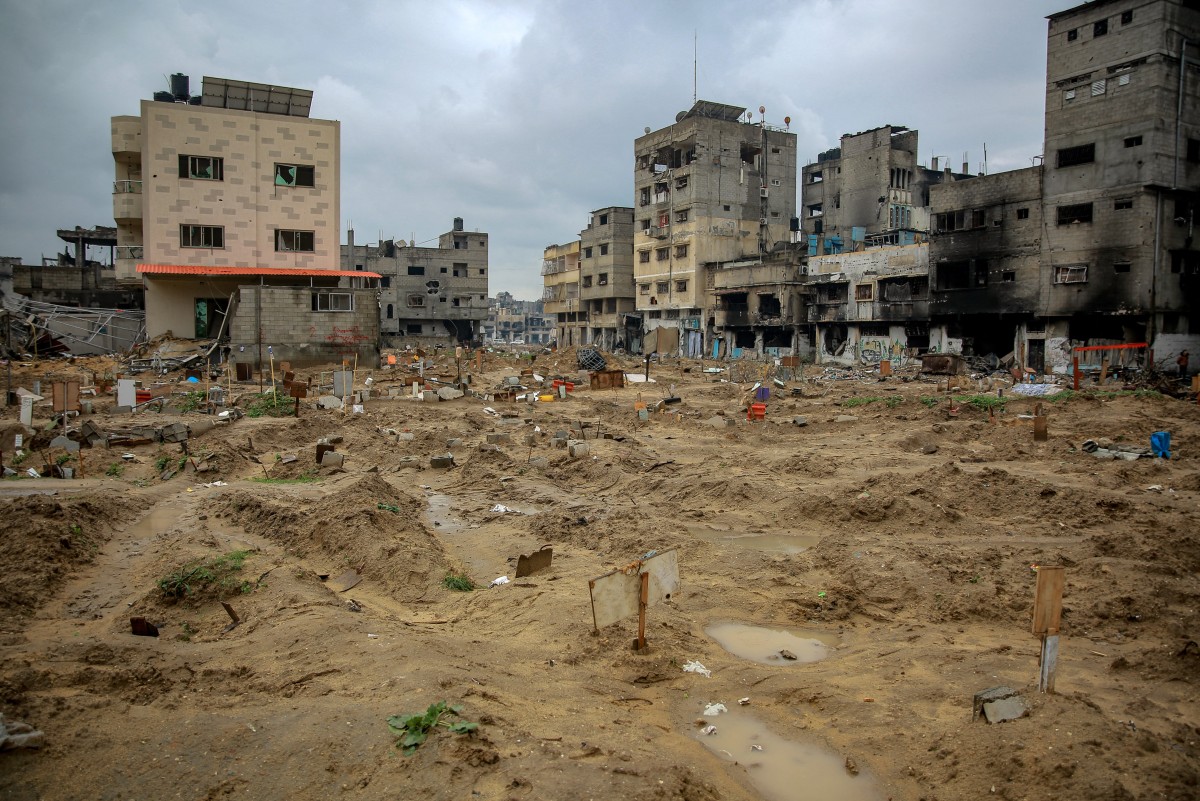Palestinian Territories – Even the dead are not spared by the Hamas-Israel war raging in Gaza, with bodies dug up by Israeli troops and hurried burials happening in hospitals and even a school.
In Gaza City’s Al-Tuffah district, shrouded corpses of Palestinians torn from their graves lay atop muddied earth.
Israel’s military had bulldozed the site and exhumed bodies, according to an AFP photographer who visited it earlier this month.
The desecration is part of a pattern which the religious affairs ministry in the Hamas-run Gaza Strip said has seen more than 2,000 graves damaged or destroyed by Israeli forces across the territory.
Israel’s military did not immediately comment on the bulldozing of cemeteries, when approached for comment by AFP.
Responding separately to allegations that soldiers have snatched bodies from graves, the military told AFP it acts “in the specific locations where information indicates that the bodies of hostages may be located”.
“Bodies determined not (to) be those of hostages are returned with dignity and respect,” it said in a statement.
The war erupted with the October 7 Hamas attack which resulted in about 1,140 deaths, mostly civilians, in southern Israel, according to an AFP tally of official figures.
The fighters also seized 250 hostages, of whom Israel says around 132 remain in Gaza, including the bodies of at least 28.
Israel’s relentless military offensive has killed at least 26,637 people in Gaza, most of them women and children, according to the Hamas government’s health ministry in the territory.
Their souls trembled
At a school packed with displaced people in the central Deir al-Balah area, Saida Jaber recalled seeing footage on social media of Jabalia refugee camp’s destroyed cemetery.
“I felt that my heart would stop,” Jaber told AFP, adding that her father, grandparents and other relatives were buried at the site in northern Gaza.
“I felt that their souls trembled… I can’t imagine how anyone dares to dig up graves and violate the sanctity of the dead,” Jaber said.
With no stop to the fighting, many Gazans have been unable to reach formal cemeteries and have instead turned to makeshift graveyards.
At a school-turned-shelter in the central Maghazi refugee camp, a woman touched the sandy earth where her daughter had been buried in the yard.
“My daughter died in my arms … we waited day and night and couldn’t send her to the emergency room,” said the woman, who did not give her name.
She told AFP that rockets hit the school compound and ignited gas canisters, causing deadly explosions.
A man tending to the site said more than 50 people are buried there, each grave containing three or four bodies, with their names written either on bricks or the adjacent wall.
Die of grief
The scale of fatalities is such that AFP journalists have seen mass graves across Gaza.
They include rows of bodies buried in the grounds of Gaza’s largest hospital, Shifa, where people have separated graves with stones and plant branches.
“If we went to the cemetery, they (Israel) might bomb us and we’d die,” said Arfan Dadar, 46, living in a tent with his family in the hospital compound.
Dadar said Israeli soldiers shot dead his 22-year-old son while he was returning to the hospital in Gaza City.
“I marked his grave, (but) now the hospital park is crammed with mass graves. I barely recognize my son’s grave,” he said.
Gazans have said they hope they can move their dead once the war ends.
Wael al-Dahdouh, Al Jazeera’s Gaza bureau chief, said he had “no choice” but to bury his son in an overcrowded cemetery in southern Rafah, after the young journalist was killed in an Israeli strike.
“We will transfer him to the martyrs cemetery in Gaza (City) after the end of the war. We want his grave to be near to us, so that we can visit him and pray for him,” said Dahdouh.
Displaced in Deir al-Balah, Jaber said she longed to return to Jabalia to check on the graves of her relatives.
“I will die of grief if they were also swept away,” she said.

